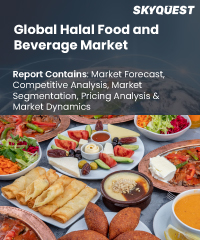
Report ID: SQMIG30I2184

Report ID:
SQMIG30I2184 |
Region:
Global |
Published Date: April, 2024
Pages:
198
|
Tables:
90 |
Figures:
76
Halal Food and Beverage Market size was valued at USD 831.73 Billion in 2023 and is poised to grow from USD 861.67 Billion in 2024 to USD 1143.46 Billion by 2032, growing at a CAGR of 3.6% during the forecast period (2025-2032).
The market is expected to be driven over the forecast period by a growing Muslim population globally and the increasing concern in food safety, hygiene, and reliability. There are 1.8 billion Muslims worldwide, according to a Pew Research Center report from April 2020. A variety of value-added halal food products, such as pasta, vegetables, juice, milk, yogurt, and cheese, have been introduced by manufacturers in response to rising demand. Moreover, the production of halal-certified food by major players in the market will raise consumer awareness of the brand.
The market is anticipated to expand from 2022 to 2030 as a result of consumers' increasing interest in consuming vegan food and beverages and the introduction of products by halal manufacturers for these ethical consumers. The market's major players are introducing vegan products as a result of shifting customer attitudes towards animal suffering and slaughter. For instance, a plant-based burger was introduced by the United Arab Emirates (UAE)-based halal food behemoth AI Islamic Foods in January 2021. The product is produced from a mixture of peas, fava beans, and sunflower protein from a non-GMO, organic farm. The initiative, which will further integrate well with the market development trend, was taken in response to the rising demand for vegan food.
Islam is the religion with the fastest rate of growth, particularly in Asia and the Pacific, which will increase the market for halal goods there. According to a piece in China Highlights, there will be nearly 25 million Muslims living in China in February 2022, with Islam constituting the majority religion. These Muslims will be clustered in smaller groups. The market is anticipated to be driven by Muslims' increasing knowledge of the importance of consuming non-haram food due to their religious beliefs. A number of companies in the region sell products that have obtained halal certification, including Ecolite, Saffron Road, Prasuma, Keventer, Prima Agri-goods, Nestle, and Pampanga's Best.
In recent years, halal food has gained appeal among both Muslim and non-Muslim consumers as it transitioned from a religious identification mark to a guarantee of the reliability, safety, and hygiene of the food. The Indonesian government passed laws requiring halal labeling and certification in April 2021, and as a result, consumers began to favor these foods more and more, according to a story in the United States Department of Agriculture (USDA).
US Halal Food and Beverage Market is poised to grow at a sustainable CAGR for the next forecast year.
Our industry expert will work with you to provide you with customized data in a short amount of time.
REQUEST FREE CUSTOMIZATIONWant to customize this report? This report can be personalized according to your needs. Our analysts and industry experts will work directly with you to understand your requirements and provide you with customized data in a short amount of time. We offer $1000 worth of FREE customization at the time of purchase.

Report ID: SQMIG30I2184